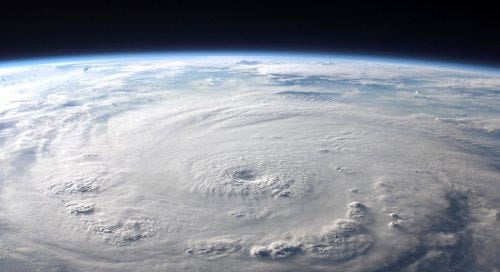New Paper Finds Tropical Storm Frequency Linked Largely To Oceanic Cycles It’s The Oceans, Stupid (Not CO2)! by Pierre Gosselin
“The increase is explained by warmer sea surface temperature, higher relative humidity, increased relative vorticity, and weaker vertical wind shear under the AMV positive phase.”
New Paper Finds Tropical Storm Frequency Linked Largely To Oceanic Cycles
It’s The Oceans, Stupid (Not CO2)!
in Extreme Weather, News and Opinion
Reading Time: 2 mins read
A A
The latest climate information video released by the Germany-based European Institute for Climate and Energy (EIKE) presents a recent paper by Huang et al appearing in the journal Geophysical Research Letters: “Contrasting Responses of Atlantic and Pacific Tropical Cyclone Activity to Atlantic Multidecadal Variability”. [emphasis, links added]
The paper examines the influences of Atlantic Multidecadal Variability (AMV) on global tropical cyclones (TCs)
The North Atlantic undergoes approximately 60-year cycles of warmer and colder than normal sea surface temperatures.
These changes in thermal surface energy play a role in modulating climate globally, especially in combination with other oceanic cycles.
Compared to the AMV negative phases, the AMV positive phase “significantly increases tropical cyclone frequency in the North Atlantic, including those making landfalls,”the authors found.
“The increase is explained by warmer sea surface temperature, higher relative humidity, increased relative vorticity, and weaker vertical wind shear under the AMV positive phase.”
“By contrast, AMV positive phase decreases TC occurrence over the western North Pacific and South Pacific, which is tied to stronger vertical wind shear and lower relative humidity. The opposite responses of TC activity to AMV positive are attributed to strengthened Walker Circulation between the Atlantic and Pacific.”
Under CO2 science, alarmists like to claim that tropical storm frequency is simply trending up and up due to man-made CO2 warming. But in fact, tropical storm frequency is far more linked to oceanic cycles.
The key points of Huang et al 2023:
So the next time we get an active tropical cyclone season, you’ll know that it has more to do with natural oceanic cycles, which we are unable to control, and it all has little to do with CO2 emissions which the media like to hype up.
Read more at No Tricks Zone







I know this. Ever since I've been on this planet (58 years), there have been hurricanes. Some come ashore, some don't.
I also would go out on a limb and say that these storms have always happened even before I was born. Some happened when there were no cars, no combustible engines and no coal-fired power plants.
Tornadoes are the same.
Droughts.
Rainy seasons.
Blizzards.
Seasons with no blizzards.
I'm going to apply for a Climate Change grant and present these findings in a peer-reviewed paper.